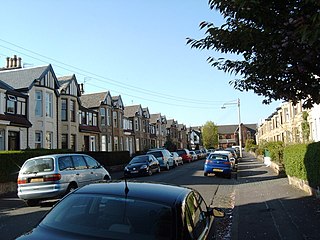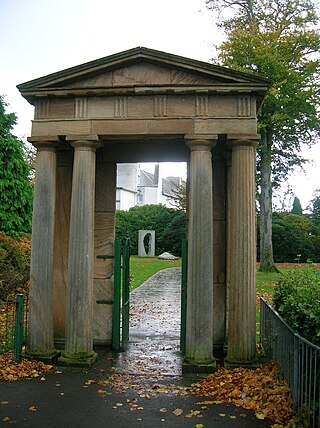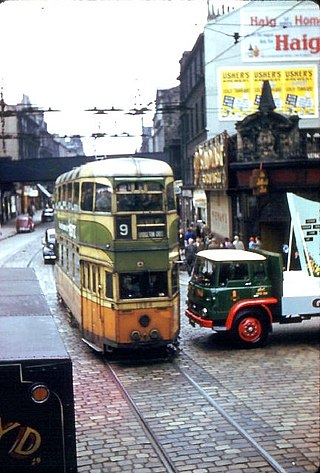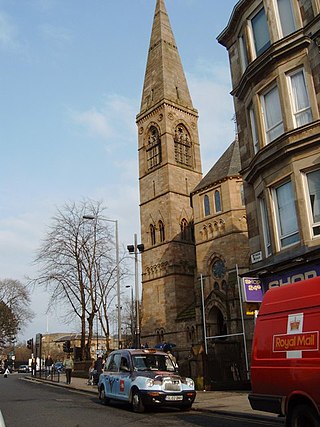
Jordanhill is an affluent area of the West End of the city of Glasgow, Scotland. The area consists largely of terraced housing dating from the early to mid 20th century, with some detached and semi-detached homes and some modern apartments.

Ibrox Stadium is a football stadium on the south side of the River Clyde in the Ibrox area of Glasgow, Scotland. The home of Scottish Premiership team Rangers Football Club, Ibrox is the third largest football stadium in Scotland, with an all-seated capacity of 50,817. The stadium was designed by renowned football stadium architect Archibald Leitch, with renovations to the stadium between 1978 and 1981, as well as 1990 and 1991, being designed by The Miller Partnership and Gareth Hutchison respectively.

Ibrox is a suburb of Glasgow, Scotland. It is situated south of the River Clyde and is part of the former burgh of Govan. The origin of the name Ibrox is unclear. It is often said to come from the Gaelic àth bruic, meaning "badger ford", but this is unconfirmed.

Sir William Alexander Smith, the founder of the Boys' Brigade, was born in Pennyland House, Thurso, Scotland. He was the eldest son of Major David Smith and his wife Harriet. He had one sister and two brothers.

Shettleston is an area in the east end of Glasgow in Scotland.

Robroyston is a suburb of Glasgow, Scotland, located around three miles northeast of the city centre.

Bellahouston is a district in the southwest of Glasgow. It is bordered by Dumbreck, Ibrox, Pollokshields, Craigton.

Lenzie is a town by the Edinburgh and Glasgow Railway in the East Dunbartonshire council area of Scotland. It is about 6 miles (10 km) north-east of Glasgow city centre and 1 mile (2 km) south of Kirkintilloch. At the 2011 census, it had a population of 8,873. The ancient barony of Lenzie was held by William de Comyn, Baron of Lenzie and Lord of Cumbernauld in the 12th century.

Broomhill is a district in the West End of the city of Glasgow, Scotland. North of the River Clyde, it is bounded by the districts of Thornwood and Partick to the south, Hyndland to the east, and Jordanhill, Scotstoun and Victoria Park to the west.
Mosspark is a district in the Scottish city of Glasgow. It is situated south of the River Clyde, in the southwest of the city.

Bellahouston Park is a public park in the Bellahouston district on the South Side of Glasgow, Scotland, between the areas of Craigton, Dumbreck, Ibrox and Mosspark covering an area of 71 hectares. The main part of Bellahouston Park was acquired by Glasgow Corporation in 1895 for the sum of £50,000, and opened to the public in 1896. Three years later, the city's second municipal golf course was established at Bellahouston, following the success of the course at Alexandra Park. The park was extended in 1901 by the addition of a part of Dumbreck Lands purchased for £2,824 from Sir John Stirling-Maxwell. A further addition was made in 1903, at a cost of £40,222, by including the lands of Ibroxhill, from which commanding views of the city are available.

Burnside is a mostly residential area in the town of Rutherglen in South Lanarkshire, Scotland. Including the neighbourhoods of High Burnside and High Crosshill, respectively south and north-west of its main street, it borders Overtoun Park in Rutherglen plus several other residential areas of the town, as well as western parts of neighbouring Cambuslang.
Holytown is a village situated to the east of Bellshill and north of Motherwell in North Lanarkshire, Scotland. Most local amenities are shared with the adjacent villages of Carfin, Newarthill and New Stevenston which have a combined population of around 20,000 across the four localities.

The Empire Exhibition was an international exhibition held at Bellahouston Park in Glasgow, Scotland, from May to December 1938.
Arthur John Dooley was an English artist and sculptor.

Glasgow Corporation Tramways were formerly one of the largest urban tramway systems in Europe. Over 1000 municipally-owned trams served the city of Glasgow, Scotland, with over 100 route miles by 1922. The system closed in 1962 and was the last city tramway in Great Britain.
Bellahouston Academy is a non-denominational state-run secondary school in Bellahouston, south-west Glasgow, Scotland.

Sherbrooke Mosspark Parish Church, also known as Sherbrooke St Gilbert's Church, is a congregation of the Church of Scotland serving the Pollokshields, Dumbreck and Mosspark areas on the south side of Glasgow, Scotland. It is within the Church of Scotland's Presbytery of Glasgow.
Albert Orr Bogle is a minister of the Church of Scotland. On 25 October 2011 he was nominated to be Moderator of the General Assembly of the Church of Scotland for 2012-2013; he was duly formally elected as Moderator on 19 May 2012 - the first day of the General Assembly's week-long annual session.

Òran Mór is a theatre, restaurant, entertainment and music venue in Glasgow. From 1862 until 1978 the building was the Kelvinside Parish Church before becoming redundant and then converted into an entertainment venue in 2004.

















